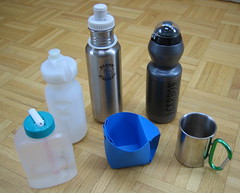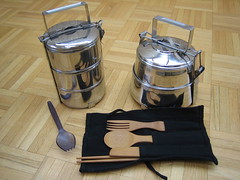Speaking From The Fire
Entrepreneurial optimism and a positive attitude have been the seat of success for visionaries in this land of opportunity, so where does the bad news of the planet fit into this be-positive, ever uplifting, inspirational, don't-bum-me-out chatter? My quest brought to mind three inspirational speakers who gave talks to my environmental leadership program.
In the walking the talk category was Peter Drekmeier, who had won a seat on the Palo Alto city council. As he began his presentation (about how to win local campaigns) he took out his own water bottle and put it on the table. It was a glass bottle with a screw top and had once been the packaging for a trendy soft drink. This simple act of reuse impressed me and guaranteed my rapt attention.
Bottled water is so ubiquitous these days, that even a roomful of environmentalists did not blink, when three cartons of bottled water were carted into the room for our hydration needs (thus disabling our fearless leader from using public transport). Okay, I did say something over lunch, gently suggesting to our program leader, that she could ask us to bring our own water, this being an environmental leadership program after all.
One of our participants did diligently collect the empty plastic water bottles for recycling. And now that Coca-Cola has agreed to use recycled plastic (10% or so) in its PET soda bottles, the market for recycled plastic is somewhat stabilized, while the rest of what's collected goes into carpet backing, plastic lumber and polar plus sweaters. Isn't this green progress?
Well, plastic bottles are a growth industry, so much so that we are falling way behind on recycling it all producing five times more by weight than we actually recycle (nifty graph here) plus the energy to make this petroleum product, the emission spewing diesel fuel to deliver water in bottles, then transport the empties to a recycling center, where it has to be crushed and bailed and more fuel to truck it to a plastics recycling plant, of which we have less than 2 dozen in the country.
Not to mention that bottled water is now a product of soft drink companies resulting in the privatization of water; they are stealing it basically from someone's local water source, given the actual price paid for access to it. The water is transported away from those who have need of it, including wildlife, then the plant pollutes the water downstream in the process. And bottled water, as we have heard, is no guarantee of purity. Some companies like Pepsi and Coca Cola are just bottling municipal water. That's right; your own town's tap water may be making these transnational companies even more profitable than their carbonated sugar water ever did. Think of the mark-up.
And if none of the above is reason enough to question bottled water, picture this - a floating plastic garbage phenomena whirling around in our Pacific Northwest ocean where all the carried-by-the-wind, littered, lost, accidentally spilled and illegally dumped plastic trash swirls together where two currents meet. An end product oil slick as it were, as big as Texas (not an exaggeration), full of bottles, bottle caps, car tires and bits of broken plastic that birds mistake for food. Then when it breaks down to the size of a fish egg it's consumed by jellyfish and plankton, the food staple of sea life. So guess who, at the top of the food chain, is not only creating plastic, "disposing" of it, but may be eating it, too. It just never really goes away.
So yes, to carry your own water bottle is to know the true cost of bottled water. You can download a new brochure from the Sierra Club to give to your friends so that they, too, may know the cost of bottled water.
Meanwhile, I had my water bottle sitting on the table too, - the stainless steel Kleen Kanteen that I bought at the Green Festival when it first came out. Guaranteed not to leach toxins over time, as plastic bottles do, it looks cool, this distinctive tall silver cylinder, feels cool to the touch and serves as a badge of identity among environmentalists. It did, however, take lots of energy to make, maybe more than all the energy combined to make those plastic water bottles that I'm not using. (It hadn't occurred to me, yet, to consider the embodied energy of my purchase at the time, so compelling was its coolness factor).
Part statement, part spiritual practice, my water bottle was added to my portfolio of green habits along with the canvas grocery bags and reused plastic produce bags I trained myself to carry to Whole Foods. Bread wrappers or the bags that line cereal boxes have been pressed into service too. I have my own chopsticks for takeout and an insulated cup for hot tea at meetings so I can avoid the dreaded Styrofoam cup. (I'm reminded of the Middle Ages when people carried their goblets on a leather thong tied to their belt and of American pioneer families who had guests bring their own plates and silverware to a dinner party. Now I'm assembling kit bags of all these things so I can grab it on my way out.)
I've proudly managed to remember to take my three-tiered stainless steal Thai lunch box when dining out, in case of leftovers. (Said lunchbox, a sentimental memento of a trip to Thailand over 20 years ago, has survived a fall from my motorcycle. You can get a similar one at To-Go Ware). I just discovered dental floss that comes in a cardboard box, not a plastic one and I've used shampoo in a bar for over ten years, though conditioner still comes in a plastic bottle. You can get toothbrushes made from recycled plastic or with replaceable heads. Toothpaste from Tom's of Maine is packaged in the supposedly recyclable metal tube, but it isn't really unless you cut off the plastic at the top and take to metal recycling. Then there's the sea sponge tampon...
Will all this make a difference? I never asked myself this, because for me, green living was my lifestyle, one I didn't press on others except by example. To be vocal about it was to believe that it could make a difference. It was, for me, more a spiritual solace to the ongoing bad news about the planet, an antidote, a way to say I won't be a part of that. Was there really a way to create a difference, a movement?
Author, Malcolm Gladwell, of The Tipping Point, says the key to things catching on is when a group of trendsetters and not necessarily a very big group, just an influential one, decides that something is a must have or a must do.
To create a sustainable business ethic, a triple bottom line of financial, environmental and social sustainability, change is best instigated by concerned people everywhere, so concluded Stanford Professor of strategic management and organizational behavior, William Barnett. With his engaging humor, he had everyone's 'aha' factor triggered, as he explained what he called The Eden Fallacy. It wasn't enough for the market to reward green business practices, he said, because that would just present two opposing criteria that were unrelated - profit and ethics.
Green businesses would thrive by marketing to an elite green niche, but the Wal-Marts of the world would still continue merrily along being hugely successful, perhaps green washing to cash in on the trend and confusing the public about what was really green. Change across the business community will come about when people inside companies introduce ethical concerns, he told us. Even inside Wal-Mart, he promised, there were people who cared; he had talked to them himself.
This was not quite the revolution I was hoping for. That it should come down to this moving of mountains by the moles within struck me as a pretty slow process, but as I thought about the Eden Fallacy, I could see that he was right and this really was the way. It would all come down to individuals working within their sphere of influence.
So how to talk about green issues? I knew from hanging out with entrepreneurs that the business community thrives on optimism, so much so that I had to wonder about the seemingly impenetrable bubble of always uplifting, always inspiring, eternally positive chatter bolstered by an industry of motivational tapes, books and speakers.
"Turn off the news," advised one motivational trainer at an all day retreat for veteran organizers. "The news emphasizes the negative aspects of humanity." Okay it does, but does that mean you don't investigate the real problems either and just focus on those post-it note affirmations on your bathroom mirror? ("Yes, I am worth $150 an hour. I help people bring peace of mind and harmony to their cluttered, chaotic lives". Apologies to my colleagues; I exaggerate a little, but not by much).
Even environmentalists don't want to hear the status updates of the ongoing planet degradation.
"It's too overwhelming," said one of my classmates (the one recycling the plastic bottles), "I just want to focus on what I can do."
"But you had to let in some bad news in order to be motivated to act, didn't you," I asked.
"Yes, that's true," she admitted.
"You have to keep bringing up the bad news," counseled Van Jones, founder of the Ella Baker Center for Human Rights in Oakland and a prison reform activist envisioning "green collar jobs". Charming and compassionate in his delivery, he exuded an underlying message that bad news shouldn't have to ruin your life.
He had an unhurried, grounded sense about him that I would identify as spiritual, speaking as he was from the pulpit of the Presbyterian Church in Palo Alto the week of Martin Luther King Jr.'s birthday. For an activist, spiritual grounding helps prevent burnout. Buddhism, for instance, is well suited to bad news.
Van Jones listed the three issues facing us today - Radical social inequality, environmental destruction and permanent war. "There is an opportunity here for tremendous positive breakthrough", he assured us. "We have had two waves of the environmental movement. The first wave was the conservation movement of Teddy Roosevelt and John Muir; the second was Rachel Carlson's book "Silent Spring" and the regulation of toxins. The third wave will be one of restorative justice, investing in solutions - biodiesel, wind, zero waste, green construction and conservation. The green economy is being born in restorative economics. Let the green wave lift all boats."
He was also a bridge, defying stereotypes with an easy humor. ("The answer to your prayers may well be a white, Republican heterosexual male looking for a charitable cause to donate to," he intoned with a smile). Then he delivered some more bad news -statistics about the incarceration of young people in prison, but the information struck us as illuminating, a missing piece of the puzzle completing a picture about the prison industry. (It's a growth industry that succeeds by failing - creating return customers. We can certainly do better for our youth given the $80,000 spent per head, per year.)
Martin Luther King, Jr., Van Jones told us, was a man who "stood in the pain of the country and called the country back to its best self." People won't want to hear bad news, he said, but you have to tell them anyway, stand at the scene of injustice and speak. Speak from the fire, but with your eyes on the stars. This was all the affirmation I needed. This was my kind of motivational speaker.
Also posted at energy bulletin






1 Comments:
That's a stunning amount of PET recyclable plastic going into waste. I suppose I'm also amazed there's an institute dedicated to improving the recycling of beverage containers.
Nice pictures of your pinto!
Post a Comment
<< Home